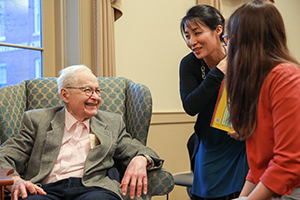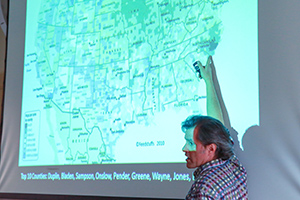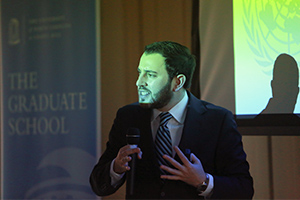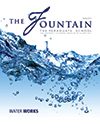
Weiss Fellows Unite Water Justice Advocates

Charles Weiss (left) with Weiss Urban Livability Fellows at the symposium.
The phrase "water justice" encompasses several threads of thought, so when the Weiss Urban Livability Program at the University of Carolina at Chapel Hill planned its Working Toward Water Justice in North Carolina March symposium, one speaker simply wouldn't do.
Instead, the group invited five experts to deliver "lightning round presentations," approximately six minutes each, during which the varied speakers discussed ideas, research and work connected to water justice issues.
Billed as "short talks and big ideas" and hosted by The Graduate School and fellowship founder and Professor Emeritus Charles Weiss, the symposium was organized by the eight fellows and the senior fellow of the Weiss Urban Livability Program. This program was conceived as a way to bring together graduate students from various disciplines to explore issues related to urban livability. The fellows meet every other week throughout the academic year for seminars during which they study this topic from all angles.
Additionally, they translate their discussions from the seminars into an annual project. The symposium was the way this cohort fulfilled that goal.
"Each year, the Weiss Fellows engage in a collaborative project that's designed to be of value both to the university and the community," said Steve Matson, Dean of The Graduate School, in his opening remarks. And the water justice theme "dovetailed nicely" with the pan-campus Water in Our World theme.
Moderator Katie Merriman, Weiss Fellow and Ph.D. student in Religious Studies, explained how the symposium was conceived as a way to address water justice and activism as well as examine engaged scholarship at Carolina. "We wanted to think about engaged scholarship and the work that we're doing both here at the university and with people in the field and the communities themselves."
The presenters covered a wide range of topics. Elizabeth Dickinson, Assistant Professor of Communication in the Kenan-Flagler Business School, spoke about environmental racism, environmental justice and storytelling. Maribel Sierra, researcher and organizer with Clean Water for North Carolina, discussed the necessity of all North Carolina residents having "access to clean, safe drinking water at an affordable cost."



Scenes from Working Toward Water Justice in North Carolina, March 26, 2013
Steve Wing, Associate Professor of Epidemiology in the Gillings School of Global Public Health, and Sarah Hatcher, doctoral student in the Gillings School of Global Public Health, each presented about different ways that the hog industry in North Carolina affects water health. Finally, Benjamin Mason Meier, Assistant Professor of Public Policy, illuminated his work related to the concept of water as a human right.
After the lightning round, the audience was invited to ask questions of the presenters before viewing an expo of numerous other scholars explaining their work related to the symposium's theme.
The symposium reflects Carolina's long commitment to engaged scholarship, said Mike Smith, Dean of the School of Government. "For nearly 100 years," he said, "this campus has believed that faculty members have an obligation to give some of their time and some of their knowledge to address real problems facing North Carolina.
"If we have expertise where we can help solve these problems, we have an obligation in our state to put that expertise forward."
♦ Laura Lacy


